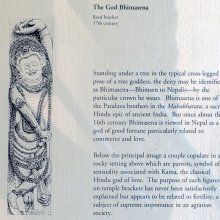Pandava, Pāṇḍava, Pamdava: 29 definitions
Introduction:
Pandava means something in Buddhism, Pali, Hinduism, Sanskrit, Jainism, Prakrit, the history of ancient India, Marathi, biology. If you want to know the exact meaning, history, etymology or English translation of this term then check out the descriptions on this page. Add your comment or reference to a book if you want to contribute to this summary article.
Pandava has 27 English definitions available.
Images (photo gallery)
Languages of India and abroad
Sanskrit dictionary
[Deutsch Wörterbuch]
Source: Cologne Digital Sanskrit Dictionaries: Böhtlingk and Roth Grosses Petersburger WörterbuchPāṇḍava (पाण्डव):—
1) m. patron. von pāṇḍu [Bhagavadgītā 1, 14. 20. 4, 35.] [Nalopākhyāna 5, 25.] pl. die fünf Kinder des Pāṇḍu (und auch ihre Partei) [Hemacandra’s Abhidhānacintāmaṇi 139.] [Mahābhārata 5, 3303.] [Hiḍimbavadha 1, 1.] [Bhagavadgītā 1, 1. 10, 37.] [Harivaṃśa 8019. 8053. 9797.] kurupāṇḍavāḥ [Rājataraṅgiṇī 1, 51.] bhedaḥ kurupāṇḍavayoḥ (im Sinne des pl.) [Mahābhārata 1, 2234.] pāṇḍavaśreṣṭha von Yudhiṣṭhira [Hiḍimbavadha 1, 48.] pāṇḍavānīka [Bhagavadgītā 1, 2.] kulaprasūta [Rgva tch’er rol pa ed. Calc. 24, 4.] gītā [Weber’s Verzeichniss No. 1318. fg.] —
2) adj. (vom vorherg.) f. ī den Kindern des Pāṇḍu gehörig: senā [Mahābhārata 6, 3303. 7, 4999.] śrī [14, 2006.] —
3) m. Nomen proprium eines Berges [Rgva tch’er rol pa ed. Calc. 297, 2.] [?17; vgl.] pāṇḍara . — Vgl. niṣpāṇḍava .
--- OR ---
Pāṇḍava (पाण्डव):—
4) uttaraḥ (uttarāḥ?) pāṇḍavo (pl. von pāṇḍu?) nāma sphīto janapado mahān [Oxforder Handschriften 354,b,2. 3.]
Source: Cologne Digital Sanskrit Dictionaries: Sanskrit-Wörterbuch in kürzerer FassungPāṇḍava (पाण्डव):—1. m. —
1) Patron. von pāṇḍu Pl. die Kinder Pāṇḍu’s und auch ihre Partei. —
2) pr. — a) eines Landes. — b) eines Berges.
--- OR ---
Pāṇḍava (पाण्डव):—2. Adj. (f. ī) den Kindern des Pāṇḍu gehörig.
Sanskrit, also spelled संस्कृतम् (saṃskṛtam), is an ancient language of India commonly seen as the grandmother of the Indo-European language family (even English!). Closely allied with Prakrit and Pali, Sanskrit is more exhaustive in both grammar and terms and has the most extensive collection of literature in the world, greatly surpassing its sister-languages Greek and Latin.
See also (Relevant definitions)
Starts with (+12): Pamdavaraharive, Pamdavarajanna, Pamdavaramaddu, Pandavabhila, Pandavabhyudaya, Pandavacarita, Pandavagita, Pandavakritya, Pandavakulaprasuta, Pandavanakula, Pandavananda, Pandavanika, Pandavapratapa, Pandavapraveshaparva, Pandavapurana, Pandavara-batthi, Pandavarani, Pandavas, Pandavasena, Pandavashreshtha.
Ends with: Apandava, Kurupandava, Lapandava, Lipandava, Madhyamapandava, Nitpandava, Pancapandava, Pracandapandava, Raghavapandava, Vipandava.
Full-text (+698): Sahadeva, Pandu, Pandaveya, Madhyamapandava, Duryodhana, Draupadi, Nakula, Yudhishthira, Dhaumya, Bhima, Arjuna, Indraprastha, Pandaviya, Nitpandava, Vidura, Khandavaprastha, Kurukshetra, Kirmira, Dhrishtadyumna, Parikshit.
Relevant text
Search found 121 books and stories containing Pandava, Pāṇḍava, Pamdava, Paṃḍava, Paṇḍava, Pāṃḍava; (plurals include: Pandavas, Pāṇḍavas, Pamdavas, Paṃḍavas, Paṇḍavas, Pāṃḍavas). You can also click to the full overview containing English textual excerpts. Below are direct links for the most relevant articles:
Brihad Bhagavatamrita (commentary) (by Śrī Śrīmad Bhaktivedānta Nārāyana Gosvāmī Mahārāja)
Verse 1.4.74 < [Chapter 4 - Bhakta (the devotee)]
Verse 1.4.86 < [Chapter 4 - Bhakta (the devotee)]
Verse 1.4.73 < [Chapter 4 - Bhakta (the devotee)]
Sahitya-kaumudi by Baladeva Vidyabhushana (by Gaurapada Dāsa)
Text 4.32 < [Chapter 4 - First-rate Poetry]
Text 11.12 < [Chapter 11 - Additional Ornaments]
Text 8.30 < [Chapter 8 - Literary Qualities]
Bhakti-rasamrta-sindhu (by Śrīla Rūpa Gosvāmī)
Verse 3.3.115 < [Part 3 - Fraternal Devotion (sakhya-rasa)]
Verse 3.2.119 < [Part 2 - Affection and Service (dāsya-rasa)]
Verse 3.3.130 < [Part 3 - Fraternal Devotion (sakhya-rasa)]
Mahabharata (English) (by Kisari Mohan Ganguli)
Shrimad Bhagavad-gita (by Narayana Gosvami)
Verse 11.13 < [Chapter 11 - Viśvarūpa-darśana-yoga (beholding the Lord’s Universal Form)]
Verse 1.20 < [Chapter 1 - Sainya-Darśana (Observing the Armies)]
Verse 1.2 < [Chapter 1 - Sainya-Darśana (Observing the Armies)]
Related products



